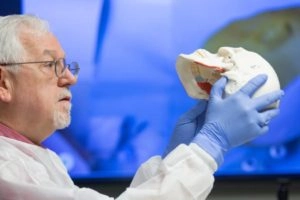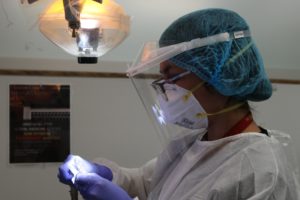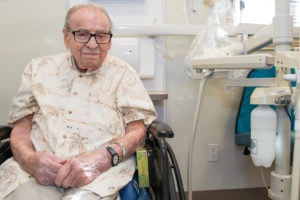The program is suitable for practicing health professionals from a wide variety of fields, including physicians, dentists, nurses, physical and occupational therapists, psychologists, pharmacists and more.
The Master of Science in Pain Medicine online program has a total of 27 courses (33 academic units), specifically designed for the practicing professional who wants to improve skills and gain expertise to deliver the best care for patients with complex pain conditions.
The curriculum is designed with a series of didactic courses in which students will gain knowledge about the diagnosis, pathobiology and management of pain conditions. The goal of this postdoctoral three-year master program is to give practicing health care providers advanced clinical, didactic, and evidence-based education in the field of Pain Medicine.
The students participate in weekly live online sessions with faculty and other program students, ensuring a collaborative and social learning experience. There are two to three courses per trimester, with two to four streaming video lectures for viewing each week. After each video lecture students complete an associated online quiz (comprising multiple choice, short answer or fill-in questions).
Earn your online Master of Science in Pain Medicine. Read more about the curriculum today.
Program Goals and Objectives
Graduates of this program will gain an understanding of the following:
1. Multidimensional Nature of Pain
- Basic neuron atoms and neurophysiology of pain
- History of theories of pain and the evolution of pain treatments
- Advanced neurophysiology of pain including immunology and epigenetics
- The history and current state of US policy and law towards opioids
- The impact of these policies on the public and the physician
2. Pain Assessment and Measurement
- Pain classification systems and Part 1 of pain diagnoses, including acute pain, headache and back pain
- Assessing patients with chronic pain
- Common pain diagnoses – Cancer, Arthritis, Fibromyalgia, Musculoskeletal
3. Management of Pain
- Psychosocial aspects of the pain experience, psychological comorbidities
- Fundamentals of pharmacological treatment of pain
- History, physiology, and policy aspects of opioids in medicine and addiction
- Psychological aspects of treating pain & its comorbidities
- Chiropractic medicine, osteopathy, homeopathy and acupuncture in the treatment of pain
- Adding a pain focus to a clinical practice: when to refer, pitfalls, building a team, marketing
- Management of physical and emotional distress at the end of life
- PT & OT techniques for assessing and treating chronic pain
- Interventional treatments and advanced pharmacotherapy–appropriate for prescribing clinicians
4. Clinical Conditions
- Understanding the mechanics of musculoskeletal pain
- Pain caused by nervous system dysfunction
- Pain as a disease: assessment, physiology, diagnoses and treatment
- Assessing and treating common orofacial pain diagnoses
Career Options
Graduates can find careers in the below fields:
Academic
Faculty positions in public and community health academic programs
Advocacy
Specialized knowledge to provide the depth needed to promote and address the health crises and health care challenges
Clinics/Practices
Positions available in schools and universities, private practice, non-profit organizations, medical centers, community health centers as well as local and state departments
Research
Research being conducted related to pain medicine at health institutes, local and national public health departments and private companies
Administration
Workplace advancement opportunities in federal, state, local, private, non-profit and non-governmental organizations
Clinical Practice
Clinician to address the needs of vulnerable populations in hospitals, universities, governmental agencies and private businesses
Industry
Private companies and governmental organizations seek those with knowledge on emerging importance for health in all communities









